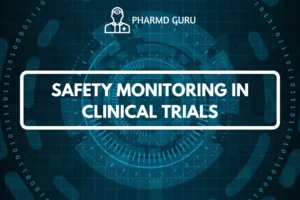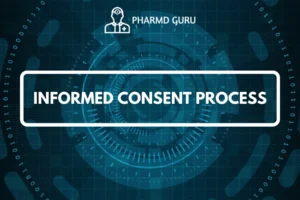Clinical trials are complex endeavors that involve various individuals and organizations working together to ensure the safety, integrity, and successful execution of the study. Each member of the clinical trial personnel has specific roles and responsibilities as outlined by the International Council for Harmonization of Technical Requirements for Pharmaceuticals for Human Use (ICH) Good Clinical Practice (GCP) guidelines. This article provides an overview of the roles and responsibilities of key clinical trial personnel, including the Sponsor, Investigator, Clinical Research Associate (CRA), Auditor, Contract Research Coordinators, and Regulatory Authorities.
SCROLL DOWN TO THE BOTTOM OF THE PAGE FOR ACTUAL NOTES
TABLE OF CONTENTS:
- Introduction
- Roles and Responsibilities of the Sponsor
- Roles and Responsibilities of the Investigator
- Roles and Responsibilities of the Clinical Research Associate (CRA)
- Roles and Responsibilities of the Auditor
- Roles and Responsibilities of Contract Research Coordinators
- Roles and Responsibilities of Regulatory Authorities
Introduction:
Clinical trials require the collaboration of various individuals to ensure the quality, integrity, and compliance of the study with ethical and regulatory standards. The roles and responsibilities of clinical trial personnel are crucial in maintaining participant safety, data integrity, and adherence to GCP guidelines.
Roles and Responsibilities of the Sponsor:
The Sponsor is typically a pharmaceutical company, contract research organization (CRO), or any other entity that takes responsibility for the initiation, management, and financing of the clinical trial. Their roles and responsibilities include:
- Protocol Development: The Sponsor is responsible for developing the study protocol in collaboration with the Investigator and ensuring it complies with regulatory requirements.
- Investigator Selection and Training: The Sponsor selects qualified Investigators and provides them with the necessary training and support to conduct the study.
- Regulatory Submissions: The Sponsor prepares and submits regulatory documents, including the Investigational New Drug (IND) application, to obtain regulatory approval for the trial.
- Monitoring and Quality Control: The Sponsor ensures adequate monitoring of the trial, including site visits, data review, and quality control activities.
- Safety Reporting: The Sponsor oversees the collection, documentation, and reporting of adverse events and ensures participant safety throughout the trial.
Roles and Responsibilities of the Investigator:
The Investigator is responsible for conducting the clinical trial at the investigational site and ensuring the rights, safety, and well-being of the participants. Their roles and responsibilities include:
- Protocol Implementation: The Investigator ensures that the trial is conducted in compliance with the approved protocol, GCP guidelines, and applicable regulatory requirements.
- Participant Recruitment: The Investigator identifies and recruits eligible participants, explains the study to them, and obtains informed consent.
- Study Conduct: The Investigator follows the protocol procedures, administers investigational products, collects and records data accurately, and monitors participant safety.
- Site Management: The Investigator manages the investigational site, including adequate staffing, infrastructure, and adherence to GCP guidelines.
- Documentation: The Investigator maintains complete and accurate records of the trial, including source documents, case report forms (CRFs), and informed consent forms.
Roles and Responsibilities of the Clinical Research Associate (CRA):
The Clinical Research Associate (CRA), also known as the Monitor, plays a crucial role in ensuring the conduct of the trial aligns with the protocol, GCP guidelines, and regulatory requirements. Their roles and responsibilities include:
- Site Selection and Initiation: The CRA assists the Sponsor in selecting and initiating investigational sites, ensuring they have the necessary qualifications, resources, and approvals.
- Site Monitoring: The CRA conducts regular site visits to monitor the progress of the trial, verifies data accuracy, assesses protocol compliance, and resolves issues or deviations.
- Data Management: The CRA ensures that data is captured accurately, complete, and consistent with source documents through source data verification (SDV) and review of CRFs.
- Adverse Event Reporting: The CRA collaborates with the Investigator in reporting and documenting adverse events and ensures timely submission to the Sponsor and regulatory authorities.
- Trial Close-Out: The CRA participates in the close-out activities, including site termination visits, reconciliation of investigational products, and archiving of study documents.
Roles and Responsibilities of the Auditor:
Auditors play a crucial role in ensuring the quality, integrity, and compliance of clinical trials. Their roles and responsibilities include:
- Audit Planning: The Auditor plans and schedules audits to assess compliance with GCP guidelines, protocol requirements, and regulatory standards.
- Audit Execution: The Auditor conducts on-site or remote audits of investigational sites, study documents, and processes to identify any non-compliance, deviations, or risks.
- Audit Reporting: The Auditor prepares audit reports highlighting findings, observations, and recommendations for corrective actions to ensure adherence to GCP guidelines.
- Follow-Up Actions: The Auditor monitors the implementation of corrective actions and verifies their effectiveness to ensure continuous improvement and compliance.
Roles and Responsibilities of Contract Research Coordinators:
Contract Research Coordinators (CRCs) provide essential support in the coordination and management of clinical trials. Their roles and responsibilities include:
- Trial Planning and Execution: The CRC assists in the planning and execution of the trial, including participant recruitment, scheduling visits, and ensuring protocol compliance.
- Data Collection and Management: The CRC collects, records, and maintains accurate and complete data in accordance with the protocol and data management plans.
- Participant Care: The CRC ensures participant well-being, provides support, answers queries, and ensures adherence to study procedures and schedules.
- Documentation and Regulatory Compliance: The CRC assists in maintaining trial documentation, including informed consent forms, regulatory submissions, and essential study documents.
Roles and Responsibilities of Regulatory Authorities:
Regulatory Authorities play a vital role in overseeing and regulating clinical trials. Their roles and responsibilities include:
- Approval and Oversight: Regulatory Authorities review and approve clinical trial protocols, oversee their conduct, and ensure compliance with ethical and regulatory standards.
- Regulatory Inspections: Regulatory Authorities conduct inspections of investigational sites, study documents, and processes to assess compliance and ensure participant safety.
- Reporting and Compliance: Regulatory Authorities require timely reporting of adverse events, safety updates, and study progress. They assess compliance with regulatory requirements and may take enforcement actions when necessary.
ACTUAL NOTES




